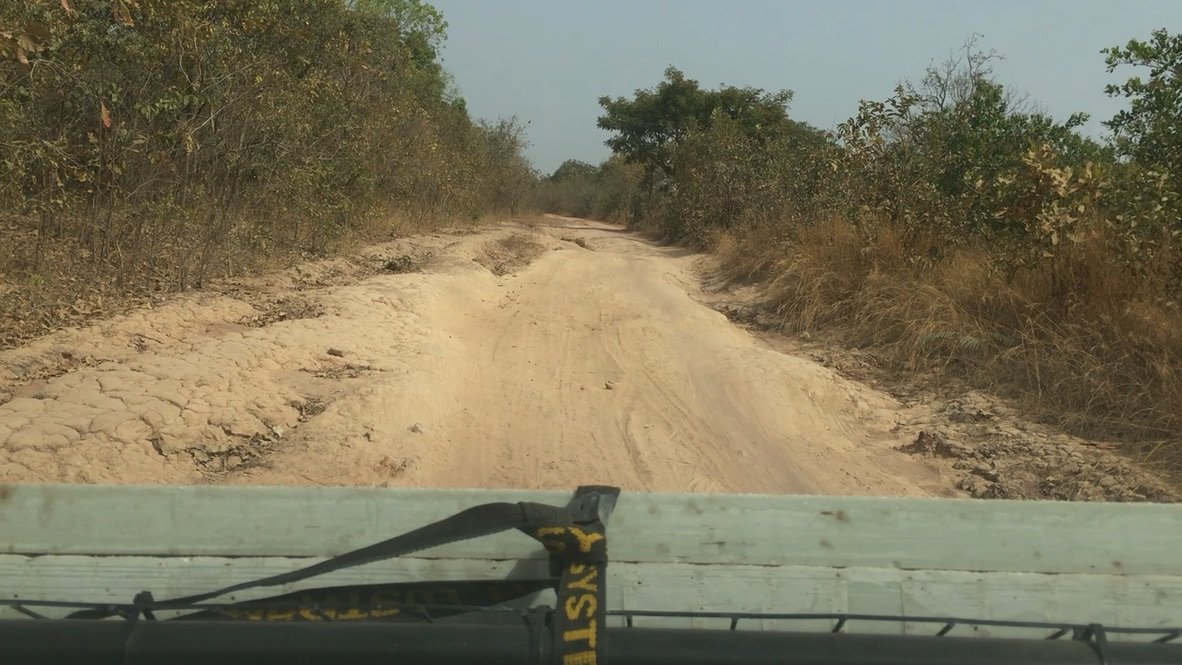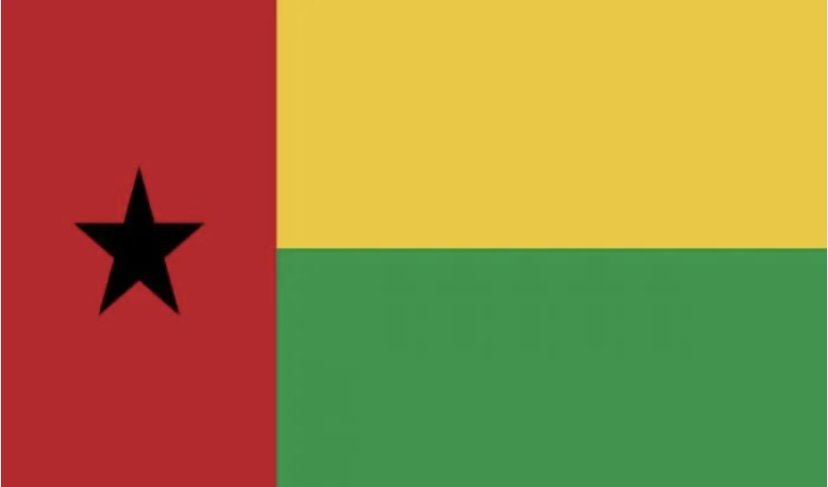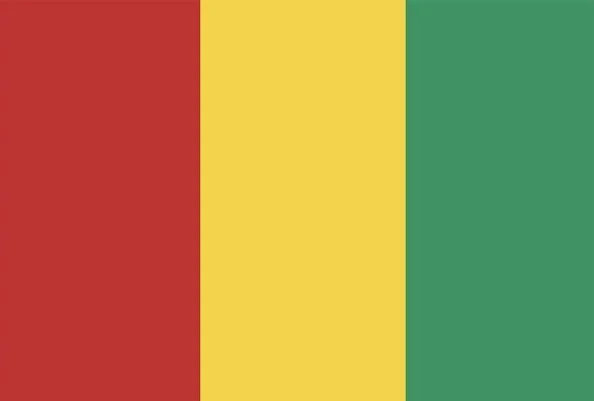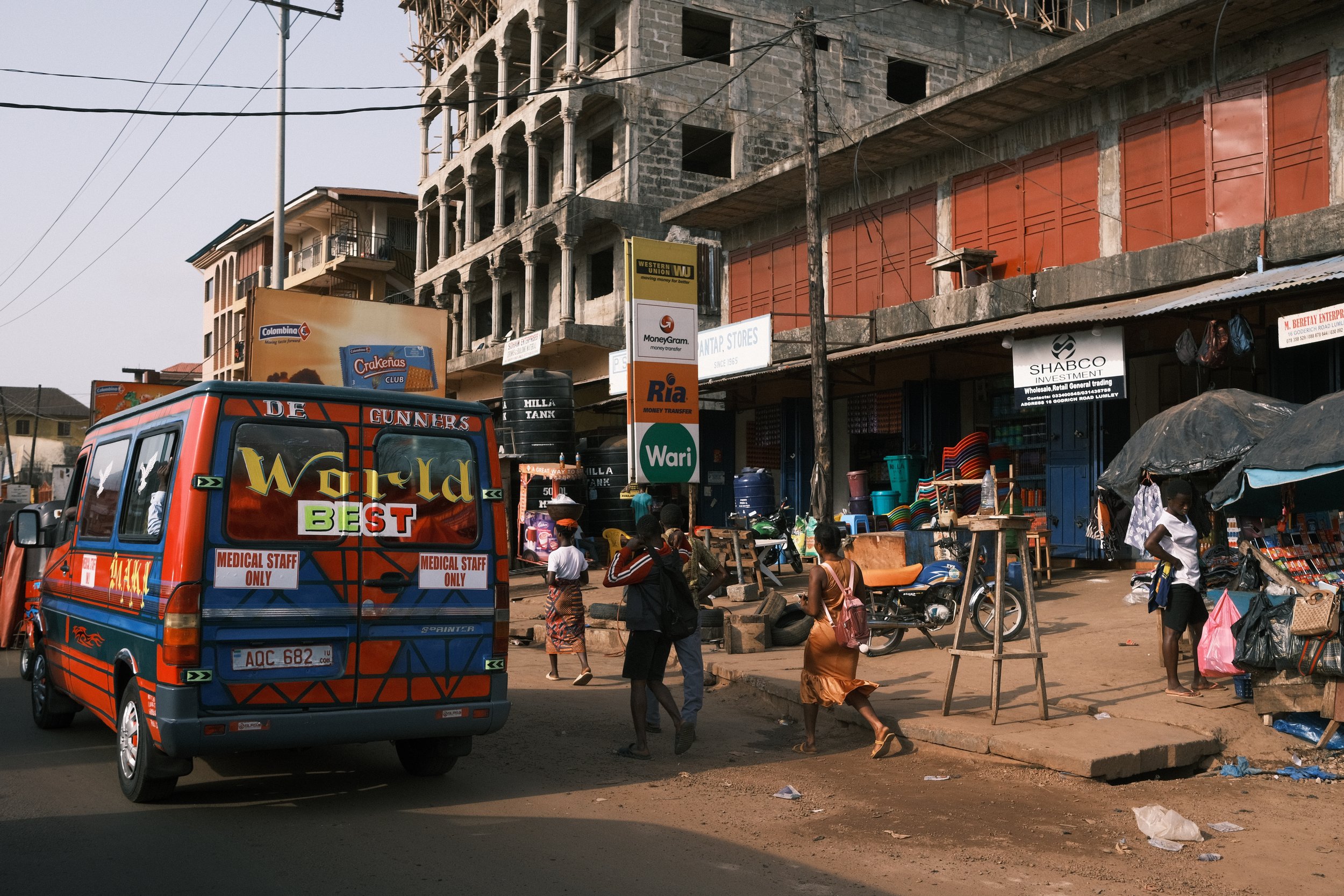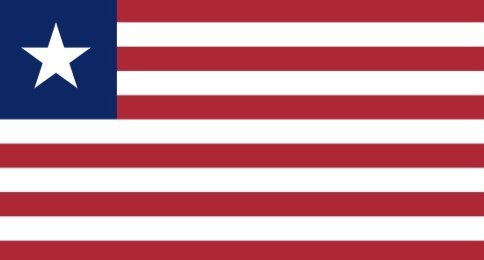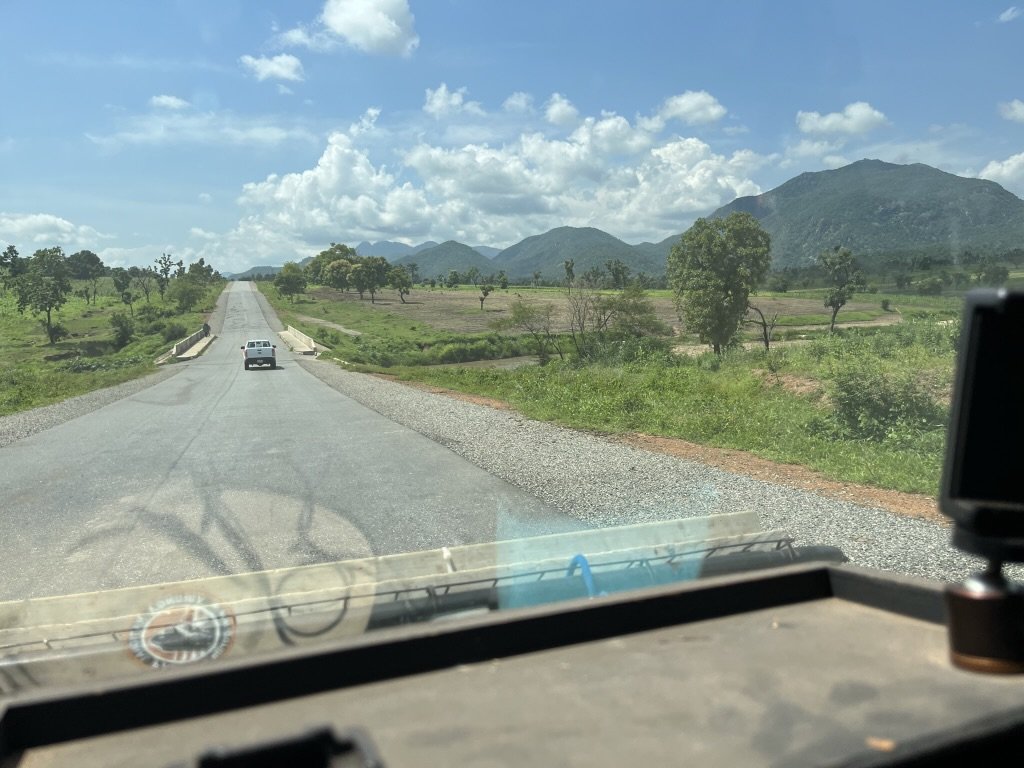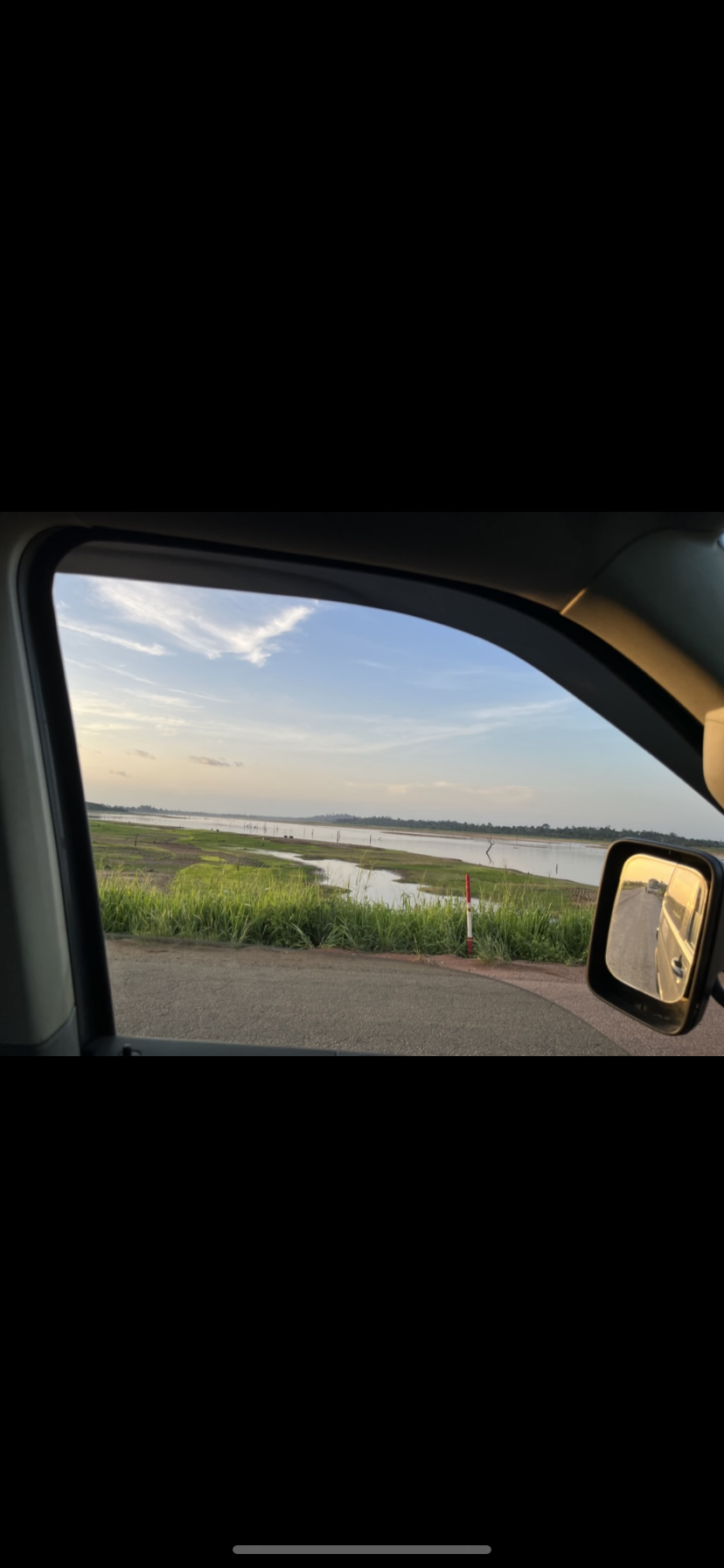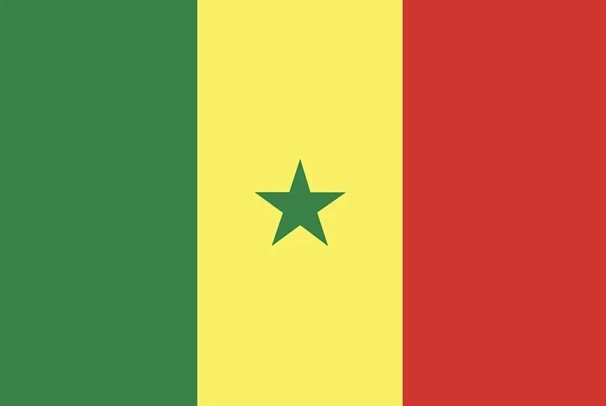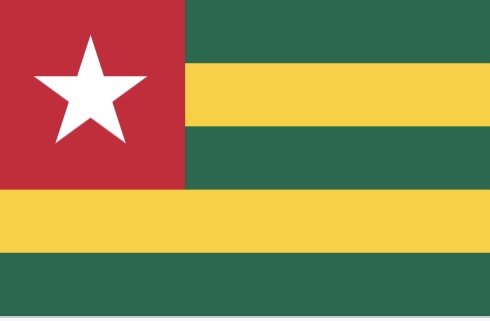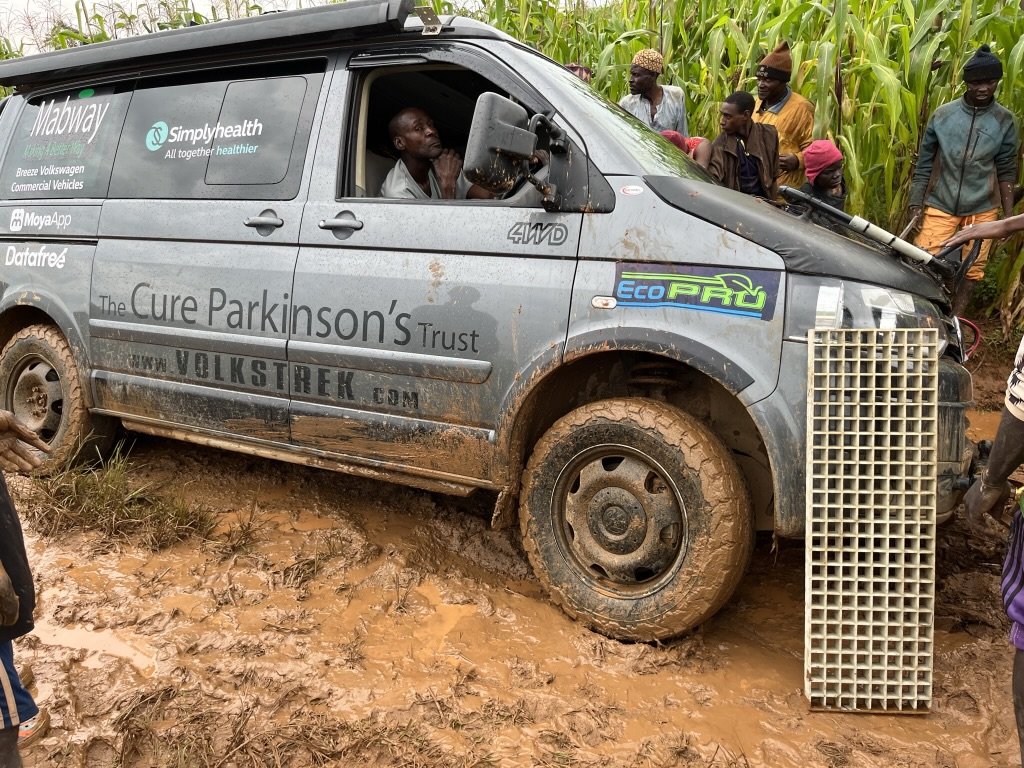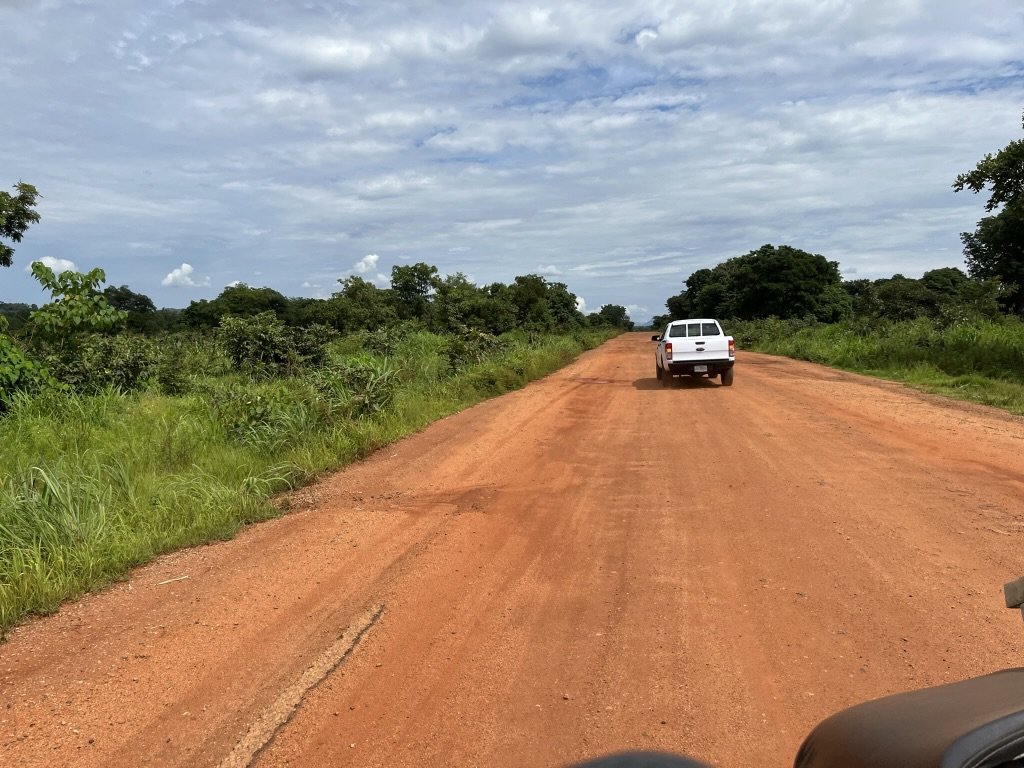
WESTERN AFRICA
Guinea Bissau – Guinea - Sierra Leone – Liberia – Ivory Coast – Ghana – Togo – Benin – Nigeria
West Africa was always set to be the most difficult section, particularly with the onset of the rainy season which arrives any time after May, turning passable roads into quagmires. The region is heavily populated with numerous roads running along the coast from port to Port, with minor roads reaching into the hinterland. All the countries are heavily populated, much more so than in Northern Africa. Cities are larger and traffic is worse; and it would be harder to camp, with daily routine activities becoming more difficult.
Guinea Bissau
The crossing from Senegal to Guinea Bissau is very rudimentary, with a token stretch of road between the two national borders. This was rough and poorly maintained. Fortunately conditions were dry and therefore manageable. Guy decided to spend a couple of days at Varela on the coast which he had heard was spectacularly beautiful. Otherwise, he chose to keep going, his only other stop being the city of Bissau in order to find one of the three cashpoints available. The city proved to be an unwelcoming place and he decided to head straight on to Boke and the crossing to Guinea.
Guinea
Crossing into French speaking Guinea afforded Guy easier communication and the ability to understand and be understood by officials when required. Sealed and gravel roads made for good progress. But with a burgeoning population and busy towns to be navigated, together with heavy traffic and more lorries moving around the country than previously experienced, the journey was hazardous. For Guy, the possibility of being shunted off the road by overladen trucks together with the need to avoid the ubiquitous Peugeot 505 taxis, all of which could achieve higher speeds with heavier loads than Guy could in his wagon, proved a constant challenge. With no need or desire to go to Conakry, Guy headed onwards towards Pamelap and the border with Sierra Leone.
Sierra Leone
As the second English speaking country on my travels, Guy was looking forward to getting there. He planned to stop in Freetown, the capital, to rest and make onward arrangements, and get his wagon serviced. Prior contact had been made with the British High Commission so arrangements were in hand for his arrival and no advance visa had been required.
Arriving at the border however, and to his complete surprise (and to that of the British High Commission), Guy found out that it is against the law to drive a right-hand vehicle in the country. Indeed it was not even possible to transit. Guy spent 48 hours camped at the border station, where immigration staff were sympathetic but powerless to do anything. So too The High Commission. Finally, and with some persuasion and high level involvement, it was agreed that Guy could take the wagon from the border to the Embassy compound in Freetown and from there get a signed letter from the Minister of Tourism providing permission for the vehicle to be kept in Freetown and eventually to exit the country by the shortest, quickest route. It meant Guy could not explore Sierra Leone with his vehicle as it was effectively impounded. But this was irrelevant given the problem that was looming on the horizon.
It was March 2020 and Covid-19 had hit hard in Europe and was inevitably going to arrive soon in Africa. Staff numbers at the High Commission were dwindling and Guy’s support contacts in the city were diminishing. He was offered accommodation with an ex-work colleague who lived in Freetown and so moved across to wait and see how the situation would evolve. But some three weeks later it became clear that Sierra Leone did not? want foreign nationals to remain as the pandemic spread. Guy would have to return home. He bought a ticket on the last flight home but that was cancelled. Two days later he found himself being evacuated on an Embassy/EU emergency flight to Belgium. He had had to leave behind his wagon and most of its contents.
Almost exactly two years later and with travel restrictions easing, Guy returned to Freetown, clutching a bag full of spare parts. He found that his vehicle was safe and in good order, ready for the next leg of his journey. Guy was glad to be back and while he went about obtaining the necessary visas and documentation for onward travel, he enjoyed his time in Freetown. Sierra Leone was proving a good place to be.
At this point, Guy was joined by Rob Hayward, a UK film maker who linked up with Guy at different points between Freetown and Cape Town to record and capture footage for a proposed documentary. Soon Guy was ready to travel east via Bo and Kenema to Liberia. Here he would be met by a ‘Fixer’ sent by Henderson’s to help him cross the border.
Liberia
Guy would have had difficulty navigating immigration without paying exorbitant ‘fees’ had the fixer not been waiting for him at the border. With his help, a troublesome border crossing proved straightforward.
Liberia has an interesting history. Originally established as a homeland for returning slaves from the US, it is the only ex-US colony in Africa, and one of the poorest countries in the world. Roads are really bad – either mud or pot-holes, however the ground is fertile and the vegetation lush. Robersport, Guy’s starting point, was once home to an Atlantic US submarine flotilla and an active settlement. Not so today after the ravages of civil war during the 1980s and 90s, and clearly without the government funds to put things right.
After a few evenings spent on the coast, Guy headed to Monrovia, the capital, to stay several weeks with a military colleague, also Henderson’s representative, while waiting for onwards visas for the Ivory Coast and Ghana. With the help of the British Embassy, he appeared on national radio and television to talk about his trip and the need to raise awareness and understanding of Parkinson’s. Such media appearances became a well grooved pattern as Guy moved from capital city to capital city.
To leave Monrovia, the best road out of the country is the one heading north-easterly towards Eastern Guinea. However, from the turn off to the border, the road quickly deteriorates, becoming a very poor and little used track all the way to the frontier. Henderson’s had provided a driver for escort and convenience. But soon Guy was at the border and on his own again.
Ivory Coast
Crossing into the Ivory Coast proved more complicated and confusing than most other borders. But finally through, Guy took the route running to Danana and then onto Man where it becomes a normal sealed road. Apart from the on-going roadworks (funded by China) to improve the quality of the surface, the going was good.
Guy had always planned to visit Yamoussoukro, the relatively new capital city, which was designed around the home to the Basilica of Our Lady of Peace. This is the second largest church in the world, towering above the trees and buildings around it. Yamoussoukro is an extraordinary place with modern buildings and six-lane highways. But, with no-one there! It appears to be a ghost town. Conveniently, the road between Yamoussoukro and Abidjan is a top quality motorway, and without a pot-hole in sight. All was going well for Guy until he reached the outskirts of Abidjan at which point his clutch failed him. This led to a necessary three weeks in Abidjan to organise and fit a new clutch, as well as undertaking the necessary administrative tasks for onward travel. But eventually, he was read to leave, heading to Ghana via Noe.
Ghana
Ghana is an ex-British colony so English is the spoken word and there is an affinity with anyone from the UK. Guy’s plan was to head north to Kumasi, the ancient Ashanti capital of the Gold Coast. He was to take part in a number of events organised by Parkinson’s Africa. He also met up with Rob Hayward, the film maker who had flown out from the UK to capture these events. They also spent some time in Accra, the capital, where getting a visa for Nigeria was the priority. In this regard, the British High Commission could not have been more helpful and with their assistance the necessary paperwork was quickly completed. Therefore, with some time to spare, Guy and Rob explored Accra, a manageable and friendly city. They would next meet in Nigeria after Guy had traversed Benin and Togo.
Togo
Togo is a relatively small country with an interesting history. But without the time for much exploration, Guy entered halfway up the country and headed straight to Lome, immediately appreciating the quality of the roads and the condition of the buildings. Dutifully following his sat nav on the fastest route to the coast, Guy was surprised and delighted to find himself entering the city via its local street markets. While an interesting city, the container port dominates this otherwise beautiful corniche and coastline. The next day, Guy made his way towards the Benin border, getting as far as the crossing over the Mono river. Here he stopped for some breakfast but ended up staying the whole day and the following night at the warm invitation of the restaurant owner.
Benin
With tight deadlines looming for various activities and meetings in Nigeria, Guy could not afford to spend any time in Benin. He entered the county early the next morning among the rush hour traffic and headed straight on, his experience there being little more than an entry visa and an exit stamp.
Nigeria
This was one of the countries that Guy was most concerned about. It is huge, heavily populated, and torn by corruption and crime. There are certain ‘no-go areas’ that you don’t necessarily know about, and security is paramount.
Fortunately, Guy was being met at the border by two security providers. Both had offered to help him in any way possible during his time in Nigeria. Therefore, with their connections, getting through immigration proved easy and, in no time, Guy and his escort were heading towards Lagos on one of the busiest stretches of road in Africa. His escorts demonstrated their proficiency at cutting through traffic. Lagos is a huge city of 20 million people and crime is rampant. With a hectic media timetable, Parkinson’s awareness events and social visits, Guy was to spend four weeks criss-crossing the city between gated compounds.
The challenge in Lagos was to get a visa for Cameroon. Guy had been advised by the Cameroonian Ambassador that she could not grant him a visa simply because the crossing was far too dangerous. This was confirmed by one of Guy’s security colleagues who highlighted some of the risks in those areas that he was due to travel through. It became clear that Guy could not undertake the journey without security escorts all the way and, even then, the only border open to him meant that he had to take the most extreme route out of Nigeria.


